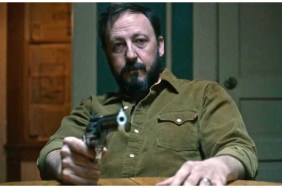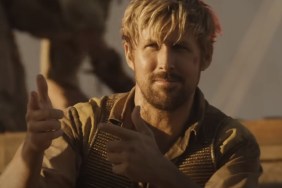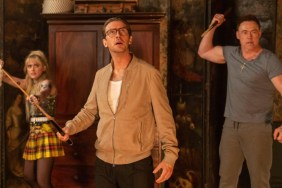Tackling the concepts of science fiction author Philip K. Dick is not something to be taken lightly by a filmmaker, which may be why Steven Spielberg made nineteen other movies before directing Minority Report, Paul Verhoeven waited until his ninth film before taking on Total Recall, Richard Linklater directed films for 15 years before doing the animated A Scanner Darkly and John Woo was nearly thirty years into career before directing Paycheck. (Sure, Blade Runner was only Ridley Scott’s third film, but come on, it’s Ridley Scott!)
Either way, it’s quite impressive that screenwriter George Nolfi (Ocean’s 12, The Bourne Ultimatum) decided to make his directorial debut with The Adjustment Bureau, a film based on one of Dick’s short stories about a secretive organization that controls fate and destiny and one brave man who decides to fight against them to create his own future.
The Adjustment Bureau stars Matt Damon as David Norris, a New York politician running for Senate when he has an encounter in a bathroom with the mysterious dancer Elise, played by Emily Blunt. When the two run into each other again, it seems they’re destined to be together, except Norris quickly learns about the organization who will do anything they can to keep them apart for the sake of Norris’ political future.
ComingSoon.net talked to Nolfi at the New York junket for the movie a few weeks back.
ComingSoon.net: Philip K. Dick has a pretty cool history in movies, especially in the last ten years or so, but they’re generally hard to make and market. How did you go about getting the rights to this story and making this? What was the basis for that?
George Nolfi: My producing partner Michael Hackett brought me the story and sorta pitched it to me. I was like, “This is a fascinating idea if you think of the obstacles in your life being fate, but they’re people.” So I could have scenes between my star and people who are forewarning him who have supernatural powers. He also suggested doing it as a love story, which is not in the Philip K. Dick story. Have you read the Philip K. Dick story?
CS: Yeah, a while ago. I know it’s very different, though it’s basically the premise, but not that story.
Nolfi: Yeah, he’s a total everyman. There’s a dog that’s supposed to bark that works for the Adjustment Bureau, a talking dog. He doesn’t bark in time, and he walks in on an adjustment. So, that part’s the same, but then he just basically gets chased. When I heard that idea, and in particular, “Well, if you could do it as a love story. He meets the woman of his dreams and for the first time, he’s ever fallen in love, and basically they come to him and say, ‘Sorry, that was a mistake. We’re going to keep you away from her forever.'” I just thought that was a really compelling, powerful premise, and we just went through the representatives of the Philip K. Dick estate. I just optioned the story for about seven years because I was doing other projects, and I finally set down to write it. It was a very hard script to crack because I explicitly wanted to do something that kind of stood outside a genre or melded genres. Looking at it now, hopefully it worked out, but at various times along the way I was like, “What am I doing? Why didn’t I just pick a simple genre thing?” (Laughs)
CS: I’ve talked to a few writers who have tackled Dick’s material, and even when you keep really faithful to the original material, it’s difficult because he tends to mix genres in his work.
Nolfi: And big ideas. Big, crazy ideas, but I really didn’t want to do a straight sci-fi movie with that kind of tone of bleak, dystopia, which most of his work has. The idea of doing it as a love story almost automatically pushes it in a different direction unless you’re going to do a tragedy. We just got the rights, and then it was just a question of hammering out, because you’re on new territory, you can’t look at, “Oh, this movie did it this way, and this movie did it this way, and that movie did it this way,” because even the other Philip K. Dick movies wouldn’t have helped with this movie.

CS: At what point did Matt come on board? I know you’d written a few of the movies he was in. Did you already have some sort of script when you first worked on “Ocean’s Twelve” and handed it to him to look at?
Nolfi: No, no, I owned the rights then, but I had not written a script. I just was thinking about, “How am I gonna do this? How am I gonna meld these genres? How am I gonna make the bureau good in the end but still have antagonism in the story?” Those are really the two things that were so hard about it – the genre thing and the Bureau, where your antagonist turning out to be totally good, but not having like say “The Fugitive” where you have an antagonist who turns out to be good, but then you have another one who’s really bad, so I didn’t have that.
CS: All the characters have a grey area to them in this movie. Even The Adjustment Bureau, they could be doing a good thing because they see something in the future they feel is more important than the two characters falling love.
Nolfi: Yeah, I mean, they’re certainly not villains, they’re just antagonists, and that’s the tricky thing. Anyway, so, I worked with Matt on “Oceans.” I was on the set the whole movie, so I got to know him pretty well. While I was on set, I wrote the very end of the last scene of “Bourne Supremacy.” That sort of was right before they were going to release, and they didn’t quite have an ending, and I proposed something to Matt, and we sat for about 45 minutes with lunch and refined it, and wrote it up. Then they flew him back from Europe to film here for a day, and it was the ending that people were happy with. That was sort of another aspect of it and then I wrote a script and gave it to him right before he left to shoot “The Bourne Ultimatum.” He read it before he left, and I actually handed it to him saying, “This isn’t done. This isn’t completely right, but I just want to know would you ever consider doing something in this kind of fantastical world and you’re carrying the story as a romantic lead?” because they were both things that he does not tend to do. I think that probably attracted him to it. He came back, he said, “Yeah, I would. Let’s talk about this. He didn’t think the character was right, but it was more of an everyman, it wasn’t a politician at that point. So we talked about it, then I went and did “The Bourne Ultimatum,” which meant I was only doing that. Then after “Bourne,” rewrote it and then that was basically the script that he said yes to.
CS: Was it always your intention to direct this?
Nolfi: For this script, yeah.
CS: Was it hard to convince anyone to let you direct it since you hadn’t directed anything previously?
Nolfi: No, Matt was so firmly in my corner in terms of saying, “I’ve been in the trenches with this guy. I’ve seen him under pressure on ‘Oceans,’ and even more pressure in ‘Bourne.’ I’m sure he can do it.” MRC took a big risk on me too because they greenlit the movie based on a script, the budget, Matt saying, “I’m attached and this guy’s my guy,” but then we had a greenlit movie, a movie start, a budget, a script, and we were walking into studios.
CS: So Universal wasn’t involved until after you put the package together?
Nolfi: Correct, correct. Then they bought it. They bought it before it was made essentially, so even though MRC cashflows the movie, which is their business model, or it was at the time, the studio’s guaranteeing not that they’re gonna distribute it and the proceeds are going to be split, but they’re just going to pay a fee for it. But Universal was fantastic, too. I mean, they really let me make the movie that I wanted to make, and that’s very rare for a first-time director, and it’s just hard for Hollywood studios to do that. So, they were great to me – unless you hated the movie, in which case (laughs)…

CS: No, actually, I liked the movie a lot. Many of the filmmakers I’ve spoken to who have worked with Matt say he’s very collaborative, such as “Inside Job” director Charles Ferguson, who said that the last few lines of his movie were something Matt came up with while doing voiceover. Could you talk about working with Matt as a collaborator, and is there many times he changes dialogue on set just to make it sound more natural?
Nolfi: Sure, sure. I mean, you want to do that as a director. I mean, there’s some dialogue like, the speech Thompson gives when he’s walking across the big warehouse, when he’s talking about history explained to the adjustment bureau. It’s very hard to change. But dialogue that’s just two people talking, there’s certain things you want to hit, and you want to hear the actors read it, and if they’re stumbling on something, or they may have a better way to say it that sounds more like them, that’s the way that movies get better. Yeah, Matt definitely does that, and we have a really easy relationship with Matt because we’ve written scenes together before. I’ll draft something, or I’ll say, “I want to do this, this, this and this,” and he’ll like start saying some lines. So we did that on “Bourne,” and we do it here.
CS: Another cool aspect of the movie is that you’re shooting in New York, and you’re not shooting in one or two locations, you’re literally all over New York. Also, the campaign montage at the opening was just so impressive, so is that something that having Matt along helps make those things happen?
Nolfi: Sure. Yeah, I mean, people were much more willing to look at the script and see what they were being asked to do knowing it was Matt playing a congressman who’s basically a frontrunner for a Senate seat. But yeah, nobody said “no” to us, everybody was like, “This seems interesting,” and they could just be themselves, so there was no written dialogue for that, and I’d just say, “He’s a congressman who is about to run, here are the circumstances. Now just talk to him.”
CS: Was it really hard getting some of the locations in New York like Yankee Stadium and the Statue of Liberty?
Nolfi: Oh yeah, they were both really hard. (Laughs) In fact, we shot the Statue of Liberty originally green screen, and the roof scene at the very end, we originally shot mostly inside. We did that for production reasons, but I saved money along the way, tried very hard to do that because I think it always makes a movie better when you can edit the movie together and look at it and see. When I put the movie together, I was like, “We just have to go to the real Statue of Liberty, I mean, no matter how hard it is. If we have the money to do it, let’s go do it.” Plus it was later in the year so there were longer days, and we have to be on a real roof. So, things like that.
CS: I remember you guys were shooting back in the summer even though the movie was supposed to come out in September.
Nolfi: Yeah, September, that’s right. Right, because I coulda shot it earlier, but Matt was doing “True Grit,” and he had long hair. So, he couldn’t go look back like David Norris.
CS: It’s really pretty amazing how many movies Matt’s been doing every year.
Nolfi: No, he was super busy, but that, it was just totally about his availability. We had saved close to 10 percent of the shooting day budget, so I had this pile of money. I had to make the movie better. It would be silly not to use it.

CS: Invariably, there will be comparisons to “Inception,” which is probably a good thing since the premise for that movie already felt rather Dickian, but also because of the suits and hats, so do you think that’s a fair comparison?
Nolfi: I mean, I’m honored, but the tone of “Inception” and this movie are so different. “Inception,” it’s a massive movie, it’s probably five or six times our budget. But, yeah, in terms of the oddness of the premise, sure. Also, I think another thing that may make that comparison resonant is the fact that I tried very hard to make the world look real, not adorned, even though it’s shot in a way that’s very beautiful, whenever the Adjustment Bureau’s onscreen because if they controlled the world, things would look more perfect, is the idea. Chris Nolan shoots stuff that looks real, but also looks incredibly rich and beautiful.
CS: This is very much New York City looking like New York City rather than being a stylized version of it.
Nolfi: Yeah, no, there was nothing. Everything was real locations. I mean, I think we did more than 70 days after we did the re-shoots, and we had 85 plus locations. I think we had a grand total of a week of inside stage shooting.
CS: Having written, produced and directed this film, are you going to try to develop other projects like this or do you want to keep directing even if it means finding a script by someone else?
Nolfi: No, I’d like to do this again, something I wrote. I’m not saying I’ll never direct somebody else’s material, assuming the public and the industry likes what happens with this one, and I have that opportunity. I would like to do it where I can have the autonomy that is given you by having written it yourself and setting it up yourself, and bringing the actors in yourself.
CS: Do you have anything written already?
Nolfi: I have a couple that are close, but I need to get this movie out first and just, international stuff. I gotta go abroad and whatever.
CS: At one point, there was some talk about you being involved with a fourth “Bourne” movie. When Matt and Paul were here for “Green Zone,” there was still some confusion about what might happen. Were you involved in that decision?
Nolfi: Well, what they’re going to do now is do a movie that is, Tony Gilroy is going to write and direct a movie that doesn’t use Matt’s “Bourne” character, but doesn’t preclude the possibility of another Paul, Matt movie.
CS: Would you be involved in that at all?
Nolfi: Maybe. I mean, I wrote something, but Paul and Matt didn’t want to go right away and do another “Bourne” movie. They’d just done a “Bourne” movie, and “The Green Zone,” and then I think they both wanted to be able to do other things first, but yeah, I don’t think anything is foreclosed.
CS: So that script may someday be revived?
Nolfi: It’s not for me – again, that’s probably years off. Tony’s gotta do his movie, and I’m sure it’ll be great.
The Adjustment Bureau opens on Friday, March 4. You can read our previous interview with actor Anthony Mackie here.









